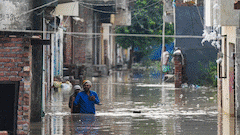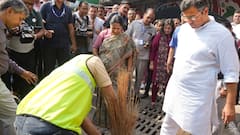Delhi Weather: Minimum Settles At 9.6 Degrees Celsius, IMD Forecasts Further Drop In Temperature
Delhi's Air Quality Index was at 337 (very poor category), according to the System of Air Quality and Weather Forecasting And Research (SAFAR).

New Delhi: The national capital recorded a minimum temperature of 9.6 degrees Celsius, a notch below normal on Wednesday morning. The maximum temperature is likely to settle at 25 degrees Celsius, said the India Meteorological Department (IMD), according to news agency PTI.
Mist and shallow fog is predicted in the capital over the next few days and the the night temperature is likely to dip to 7 degrees Celsius, said IMD.
The maximum temperature in Delhi on Tuesday settled at 24.1 degrees Celsius, a notch below normal, the MeT office said. The relative humidity oscillated between 50 and 90 per cent.
The minimum temperature on Monday was recorded at 7.6 degrees Celsius, a notch below normal, and the maximum temperature was 25.6 degrees Celsius.
ALSO READ: Delhi Pollution: Air Quality Continues To Be 'Very Poor' Amid Ban On Construction Work
Air quality remains 'very poor'
Delhi's Air Quality Index was at 337 ( very poor category) on Wednesday morning, according to the System of Air Quality and Weather Forecasting And Research (SAFAR). While the 24-hour AQI average was 353 on Tuesday.
An AQI between 201 and 300 is considered poor, 301 and 400 very poor, and 401 and 500 severe.
On Sunday, the the Commission for Air Quality Management (CAQM) implemented Stage III of the GRAP which includes a temporary ban on construction and demolition activities in Delhi-NCR as part of its Graded Response Action Plan (GRAP). This came after the panel observed that the air quality saw a further deterioration over the last 24 hours.
In a release, the Commission for Air Quality Management (CAQM) said, "As the AQI in Delhi has slipped into 'severe' category, the sub-committee had decided that all actions, as envisaged under Stage III of the GRAP, be implemented in right earnest by all the agencies concerned, with immediate effect in the NCR, in addition to all action under Stage I and Stage II of the GRAP."
Milk and dairy units and those involved in the manufacturing of life-saving medical equipment, drugs and medicines, were exempted from the restrictions stipulated in the CAQM order.





































